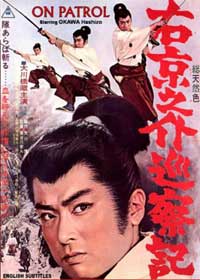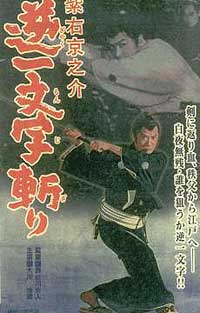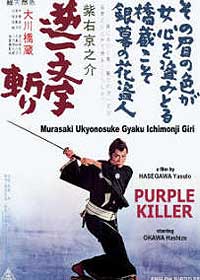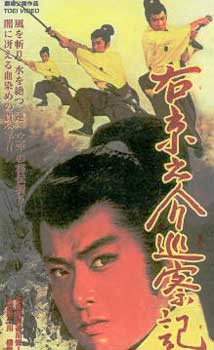Hashizo Okawa stars in Adventures of Ukyonosuke aka On Patrol (Unkyonosuke jyunsatsuke, Toei, 1963) with support cast including Kikuko Hojo, Yuriko Mishima, Seishiro Sawamura, Eijiro Tono, Shiro Osaka, Eitaro Ozawa, & Kensaku Hara.
 Hashizo plays to roles. He is the puritanical samurai Sena Denemon, a bookworm & widower, in the first half of the film. And he plays Sena's son in the second half of the film, grown to avenge his father's unjust death. Hashizo plays to roles. He is the puritanical samurai Sena Denemon, a bookworm & widower, in the first half of the film. And he plays Sena's son in the second half of the film, grown to avenge his father's unjust death.
Okawa's physical beauty is well subdued by make-up & scowling expression in the first half of the film, in which he seems genuinely a more mature man, using the famed Hashizo smile only once (during an affectionate gaze at his son) & otherwise seeming perpetually haunted & haggard because of the amount of corruption he unhappily witnesses.
As a retainer of meager resources who won't accept bribes, he comes across as the ultra-pure samurai who according to genre cliche should be able to right all wrongs during his mission to "root out injustice." The film is more serious than that, however, so when Sena finds the evidence he requires to set things right, he is so successfully conspired against by other vassals that he ends up under house arrest for crimes not committed.
After a ninja encounter (the only real fight sequence in the film's tastefully restrained first half), one of the ninja escapes with the evidence of corruption, & Sena's mission is in ruins.
We've seen that samurai purity not only has the potential for utter failure, but we've also seen that the the feudal system of duty is inherently so unjust that even a pure man like Sena cannot help but bring harm to the innocent. When a retainer threatens seppuku if Sena won't accept a bribe from his lord, Sena says to please do so, & the retainer retracts the threat. But when an innocent woman is sent to seduce Sena, he knows she has been directed to kill herself if she fails, yet he remains puritanical to the end. She kills herself in the snow outside his home. When her thirteen year old brother tries to kill Sena on the highway, he attempts not to kill the child avenger, but ultimately must engage him in serious battle.
We also see the ruined life of an old village headman, along with plenty of other evidence that to live one's life decently under a feudal system, causing no harm to others, is pretty much impossible.
The second half of the film is not so deadly serious, nor as arty, nor as honest about the realities of feudalism. Whereas the slaying of an avenger no older than thirteen was not done in any exploitative manner in the serious portion of the film, the action in the second half of the film is all for the sake of action only It thus adheres to a more simplistic escapist adventure attitude encountered in the usual chambara film. It remains a rousing good film even so, but the contradiction in tone makes for an uneven experience.
Young Ichitaro grows up to look pretty much like his father, naturally enough, though Okawa's acting is good enough that he definitely seems to be a different guy, & the utter change in the film's tone contributes to our belief in two distinct characters embodied by one actor.
Ichitaro, later renamed Ukyonosuke, is raised by an old ninja trainer (Eijiro Tono) who turns out, concidentally, to be one of the plotters against Ichitaro's father years before. The old ninja Doki is unaware of this & raises Ichitaro to be the best Chichibu ninja ever. Doki's hope is that Chichibu ninjutsu will one day be as famed & mighty as that of the Iga & Yagyu.
When Doki eventually learns his ward's identity, he tries to kill him, but not only is he incapable of killing the boy he loves, he also cannot kill his hopes for his ninjutsu school's future success. But even had he been willing, it is doubtful he could have defeated Ichitaro, who has somehow inherited his father's "Point-down blade" posture of defense, which allows for no counterattack.
So Doki lets Ichitaro believe the life-&-death duel was merely his final test, gives Ichitaro his new name, & lets the young man set off on his quest for revenge, hoping the boy will never learn that Doki is one of his enemies.
In manner & dress, Ichitaro becomes the ultimate beautiful samurai, but with the added bonus of ninjutsu training. After much ordinary but exciting chambara adventuring, Ukyonosuke's road leads back to Doki. The old ninja has lost all hope for his school's greatness & now must try to kill the very man who he regards as "the great work of my life."
Eijiro Tono is an outstanding character actor & brings as much depth to Doki as any actor could, though his part is bound more by the conventional plot than by individuality of his character. Ukyonosuke uses his father's Point-down sword form & Doki is mortally cut. He stands for some while gazing at his killer with both pain & love etched on his remarkably expressive face.
Ukyonusuke suddenly regrets his deed & shouts, "Doki! You let me win!" The old ninja says, "No. I didn't. Your sword defeated this Doki."
 Then the old man falls, living long enough to make a gift of his sword Ominokami to Ukyonosuke, who may keep the Chichibu ninjutsu school alive after all. The film closes with the key bad-guys still prospering, so obvioiusly there was going to be a Part II. Then the old man falls, living long enough to make a gift of his sword Ominokami to Ukyonosuke, who may keep the Chichibu ninjutsu school alive after all. The film closes with the key bad-guys still prospering, so obvioiusly there was going to be a Part II.
In the sequel New Adventures of Ukyonosuke aka Purple Killer (Murasaku Ukyonosuke gyaku ichimonji giri, Toei, 1964), Hashizo's support cast includes Norikoku Kishimoto, Yuriko Mishima, Shiro Osaka, Ryohei Uchida, Misako Watanabe & Eitaro Ozawa.
Ukyonosuke is still on his kataki-uchi mission of moral revenge due to his father being unjustly cornered into having to commit seppuku eighteen years earlier when Ukyonosuke was just a lad.
He has grown to be a master swordsman. His attractive fighting style has him reaching far & high to one side, quite an exaggerated move. This image is often used in a story that is crammed with bloody thrilling action.
 The beauty of his affected swordstyle, & of fresh-faced Hashizo himself, is reflected in an equally aesthetic film score centering around koto music, exceptionally attractive costuming, gardens, statuary, architecture all very loveingly photographed, & even the ornate dialogue. The beauty of his affected swordstyle, & of fresh-faced Hashizo himself, is reflected in an equally aesthetic film score centering around koto music, exceptionally attractive costuming, gardens, statuary, architecture all very loveingly photographed, & even the ornate dialogue.
Ukyonosuke wants to clear his father's name. He has obtained his father's inspection records which prove his innocence. But proving that Sena Denemon's downfall was due to his straight-laced nature amidst corrupt vassals is not the sort of thing that serves the interests of living men involved.
A strong, one-armed swordsman, brother of a woman killed in the first film, becomes Ukyonosuke arch-foe. Their duels are extraordinary, but eventually Ukyonosuke's "top down blade posture" wins the day.
An evil magistrate must also meet his downfall. When Ukyonosuke's vengeance is achieved, he's quite chipper & dapper as he decides to go on his "mushyo shugyo" or knight's journey to strengthen himself & learn.
This pair of films together form an excellent example of Toei Studio's wonderfully well done commercial chambara. They aren't the poker-faced art one gets from Kobayashi or Kurosawa, but good golly it's good stuff in its own right.
copyright © by Paghat the Ratgirl
|

 Hashizo plays to roles. He is the puritanical samurai Sena Denemon, a bookworm & widower, in the first half of the film. And he plays Sena's son in the second half of the film, grown to avenge his father's unjust death.
Hashizo plays to roles. He is the puritanical samurai Sena Denemon, a bookworm & widower, in the first half of the film. And he plays Sena's son in the second half of the film, grown to avenge his father's unjust death. Then the old man falls, living long enough to make a gift of his sword Ominokami to Ukyonosuke, who may keep the Chichibu ninjutsu school alive after all. The film closes with the key bad-guys still prospering, so obvioiusly there was going to be a Part II.
Then the old man falls, living long enough to make a gift of his sword Ominokami to Ukyonosuke, who may keep the Chichibu ninjutsu school alive after all. The film closes with the key bad-guys still prospering, so obvioiusly there was going to be a Part II. The beauty of his affected swordstyle, & of fresh-faced Hashizo himself, is reflected in an equally aesthetic film score centering around koto music, exceptionally attractive costuming, gardens, statuary, architecture all very loveingly photographed, & even the ornate dialogue.
The beauty of his affected swordstyle, & of fresh-faced Hashizo himself, is reflected in an equally aesthetic film score centering around koto music, exceptionally attractive costuming, gardens, statuary, architecture all very loveingly photographed, & even the ornate dialogue.